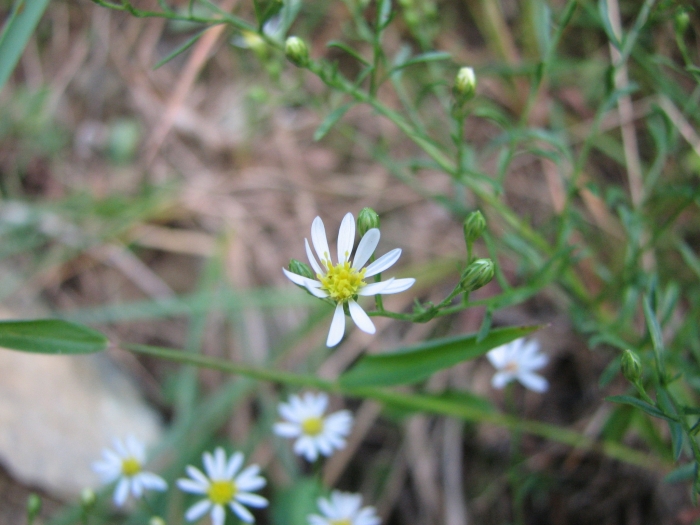Serpentine Aster
(Symphyotrichum depauperatum)
Serpentine Aster (Symphyotrichum depauperatum)
/
/

Chris Hoess
CC BY-SA 4.0
Image By:
Chris Hoess
Recorded By:
Copyright:
CC BY-SA 4.0
Copyright Notice:
Photo by: Chris Hoess | License Type: CC BY-SA 4.0 | License URL: http://creativecommons.org/licenses/by-sa/4.0/ | Rights Holder: Chris Hoess | Publisher: iNaturalist | Date Created: 2013-09-07T18:05:38-07:00 |




















Estimated Native Range
Summary
Symphyotrichum depauperatum, commonly known as Serpentine Aster or Starved Aster, is a perennial herb that is native to serpentine barrens and diabase glades, ecosystems characterized by high soil toxicity and low nutrient levels, which can be found in specific regions such as Pennsylvania, Maryland, and North Carolina. This species is adapted to these challenging conditions and typically grows up to 20 inches tall. The plant features narrow leaves and produces flowers with white ray florets that encircle yellow disk florets, blooming in the late summer to fall and providing a modest display of color.
Serpentine Aster is valued for its ability to thrive in poor soils where other plants struggle, making it a candidate for restoration projects and naturalistic plantings in similar harsh environments. It requires well-drained soils, typically those with a serpentine base, and full sun to part shade conditions. While it is not commonly used in general horticulture due to its specific soil requirements, it is of interest for conservation and ecological studies. Gardeners who wish to cultivate this plant should mimic its native serpentine soil conditions and manage for competition from more aggressive species. Serpentine Aster is classified as threatened in Pennsylvania and is globally imperiled, with habitat disruption posing a significant threat to its survival.CC BY-SA 4.0
Serpentine Aster is valued for its ability to thrive in poor soils where other plants struggle, making it a candidate for restoration projects and naturalistic plantings in similar harsh environments. It requires well-drained soils, typically those with a serpentine base, and full sun to part shade conditions. While it is not commonly used in general horticulture due to its specific soil requirements, it is of interest for conservation and ecological studies. Gardeners who wish to cultivate this plant should mimic its native serpentine soil conditions and manage for competition from more aggressive species. Serpentine Aster is classified as threatened in Pennsylvania and is globally imperiled, with habitat disruption posing a significant threat to its survival.CC BY-SA 4.0
Plant Description
- Plant Type: Herb
- Height: 1-2 feet
- Width: 1-1.5 feet
- Growth Rate: Moderate
- Flower Color: White
- Flowering Season: Summer, Fall
- Leaf Retention: Deciduous
Growth Requirements
- Sun: Full Sun, Part Shade
- Water: Medium
- Drainage: Medium, Fast
Common Uses
Butterfly Garden, Low Maintenance, Rock Garden
Natural Habitat
Native to serpentine barrens and diabase glades
Other Names
Common Names: Serpentine Aster, Eastern Serpentine Aster, Starved Aster
Scientific Names: , Symphyotrichum depauperatum, Aster depauperatus, Aster depauperatus var. depauperatus, Aster ericoides var. depauperatus, Aster ericoides var. pusillus, Aster parviceps var. pusillus, Aster pilosus var. pusillus,
GBIF Accepted Name: